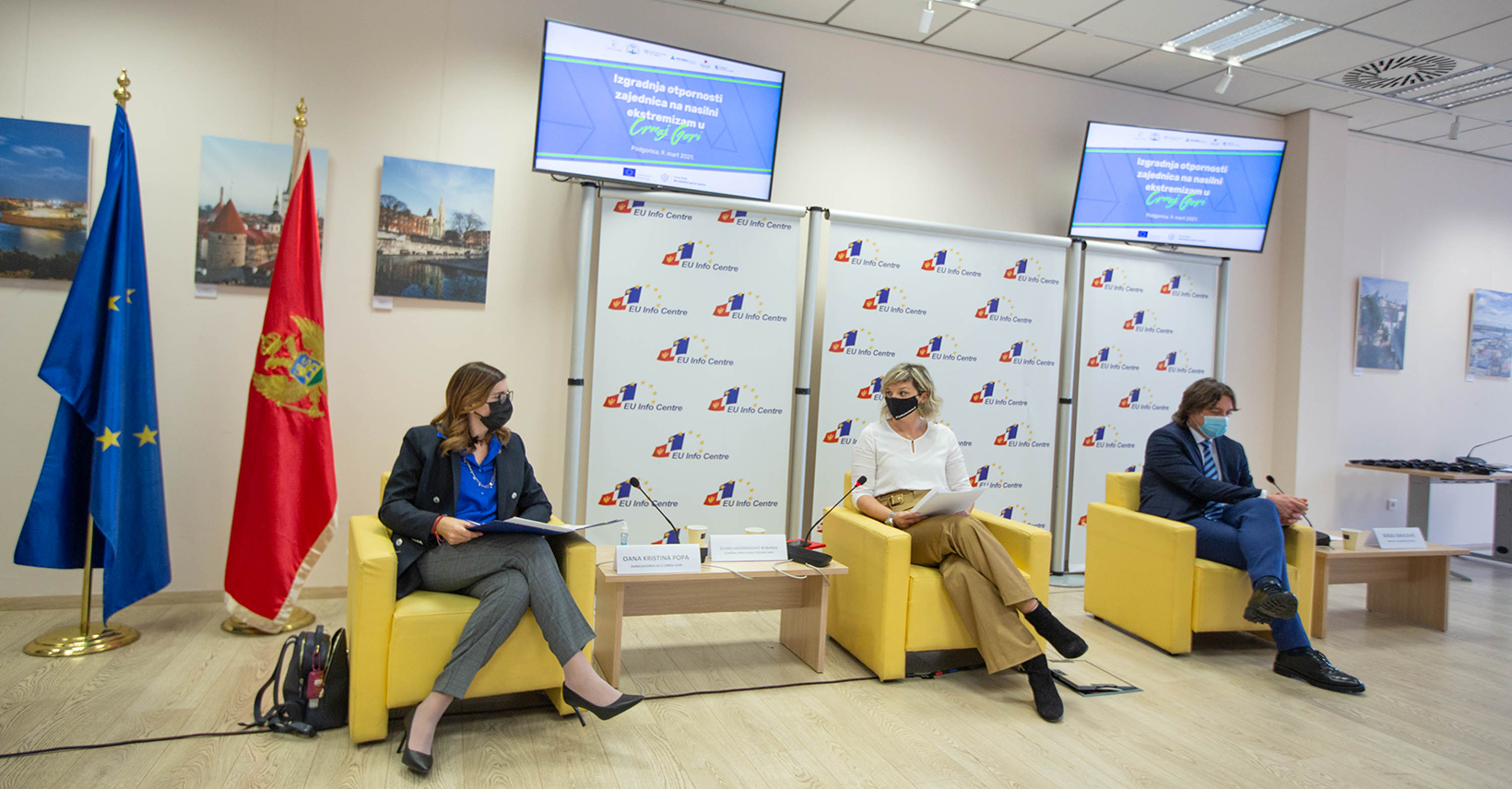Growing risk of radicalisation leading to violent extremism
08.03.2021.
Forum MNE organized a press conference in the EU Info Center “Building Communities’ Resilience to Violent Extremism in Montenegro.” On that occasion, initiatives of four Montenegrin civil society organizations, which will be supported in their P/CVE activities, were presented.
Organizations were selected through a public call for proposals launched in the framework of the project “Communities First: Creation of a civil society hub to address issue of violent extremism – from prevention to reintegration” implemented in six Western Balkans countries. The goal is to empower local organizations and civil society activists who are often the first one to notice changes in the community or among individuals, and first one to respond adequately to them.
Forum MNE, with partners from the Western Balkans, has been working for three years to build community resilience to violent extremism:
“After 42 trainings, 840 practitioners from the civil sector who were trained within the regional project, numerous other activities such as the creation of the Civil Society Hub, which mapped 210 organizations, we decided to launch a small grants program that enabled organizations to create their prevention programs, based on the needs of local communities. Violent extremism is a complex phenomenon that requires an equally complex multi-sectoral approach”, pointed out Forum MNE Executive Director Elvira Hadzibegovic Bubanja.
Minister of the Interior Sergej Sekulovic also addressed the audience, providing data from the end of 2020, according to which 26 Montenegrin citizens (eighteen men, five women and three children) traveled to Syria, and five to Ukraine since the beginning of the conflict in 2012. Ten of them returned from Syria, and five from Ukraine. After the amendment of the Criminal Code from 2015, which prescribes participation in foreign armed conflicts as a criminal offense, two FTF returnees were convicted.
“The essence, however, is not in the classic prison sentence, but in a healthy, normal attitude towards the other and different as the basis of deradicalization. This topic requires a comprehensive response from the state, public institutions, civil society in its widest definition, media and family. We need to build a democratic, free, and inclusive society. Only thus we can reduce these threats to a minimum. We must work on the homogenization of Montenegrin society, strengthening of regional cooperation, without which we cannot solve any major security issue, and of course strengthening institutions and accelerating EU integration” said Sekulovic.
Researches have shown that an increasing number of young people are being targeted by extremist groups. The whole of Europe is currently facing this growing danger.
“The extremist threat, has mutated and evolved in the last years, spreading across our continent. Today, extremism is being driven by a wide range of sources, including nationalist ideologies, religious fundamentalism, violent right-wing and left-wing groups and anarchists. The risk of radicalization leading violent extremism in the European Union is growing and ideology-motivated attacks not only result in loss of life and economic damage, but also divide communities across Europe and fuel extremist views”, said Oana-Cristina Popa, Head of Delegation of the European Union to Montenegro.
Twenty-four organizations from the region were awarded a grant through a small grants program. In the upcoming months through various activities they will tackle the issue of violent extremism in their local communities. Supported initiatives in Montenegro are: “Local Action Planning – Step Towards the Society for Everyone (NGO Alfa Center)”, “Schools as a Resource for Prevention and Countering Hate Speech, Extremism and Radicalism” (NGO Children of Montenegro), “Prevention Through Community Involvement” (Monitoring Group Ulcinj – MogUL), and “#IsolateExtremism” (NGO COSMO).
In total of 206 applications were submitted for the call for proposals. The total amount of allocated funds is 120,025.27 EUR.
The activity is part of the regional project “Communities First: Creation of a civil society hub to address issue of violent extremism – from prevention to reintegration” implemented by Forum MNE (Montenegro) in partnership with Centre for Legal Civic Initiatives (Albania), Hope and Homes for Children (Bosnia and Herzegovina), Partners Kosova – Centre for Conflict Management (Kosovo), Centre for Common Ground (North Macedonia), and Cultural Centre DamaD (Serbia), funded by the European Union and co-funded by the Ministry of Public Administration of Montenegro.
